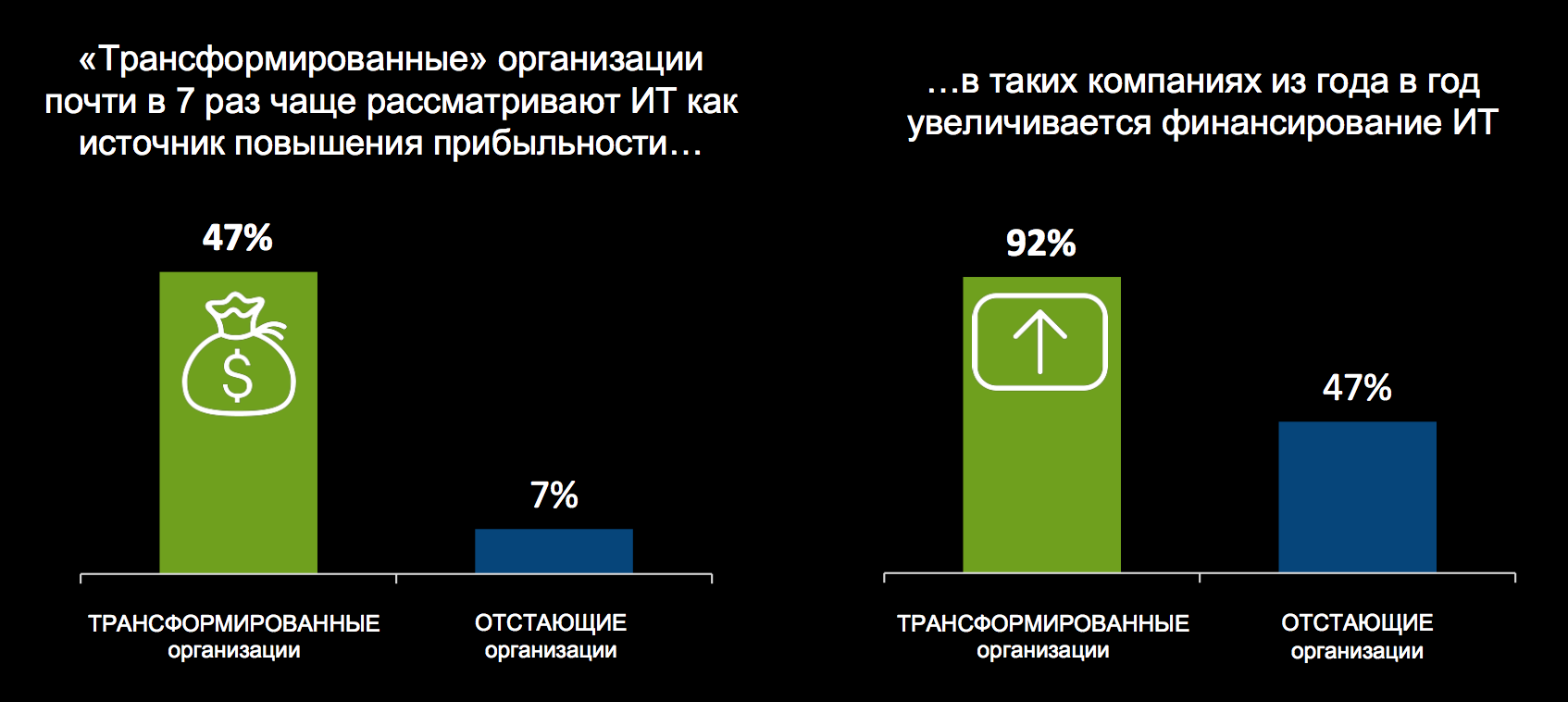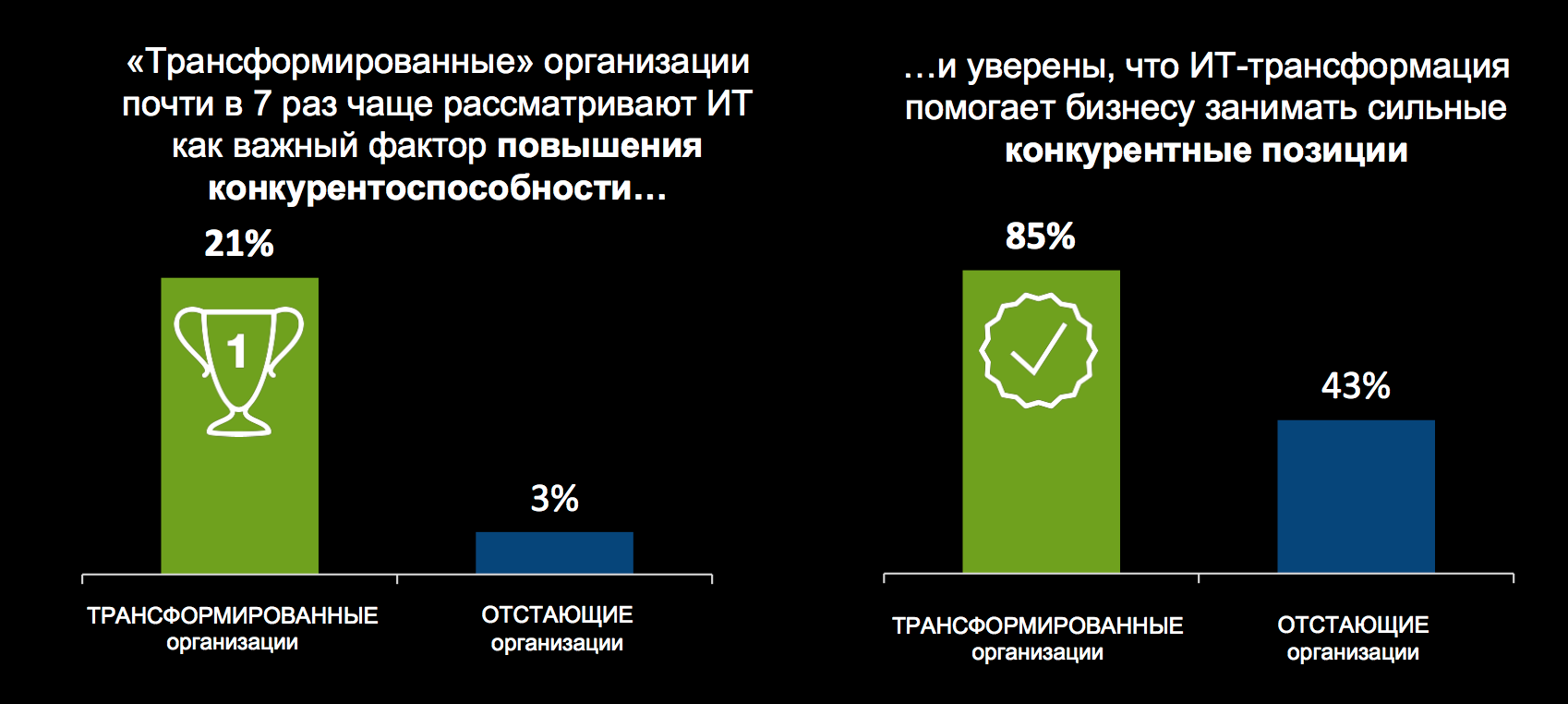Dell EMC Announces ESG 2017 IT Transformation Maturity Curve Survey Results
- 71% of companies recognize that IT transformation is necessary to achieve competitiveness.
- 95% of respondents do not use IT transformation to achieve their business goals.
- "Transformed" organizations are seven times more likely to recognize IT as a determining factor for increasing profits and increasing competitiveness.
- Last year, 96% of “transformed” organizations exceeded revenue targets; they have twice as many chances to get ahead of these targets.

The company Dell EMC announces a new study in 2017 ESG IT Transformation Maturity Curve, conducted by analyst firm Enterprise Strategy Group (ESG). In a survey of IT directors and executives of large companies in different countries, it turned out that most respondents are sure that their organizations do not yet fully use various aspects of IT transformation in order to remain competitive in an increasingly digital world.
Organizations are facing the challenge of transforming legacy IT systems and technologies, and digital transformation is becoming a driving force. However, as this study showedcommissioned by Dell EMC, 95 percent of respondents say their organizations run the risk of lagging behind a small group of companies that are already transforming their IT infrastructures, processes, and methods for delivering products / solutions / services to accelerate their transformation into a “digital enterprise.”
Many organizations still measure the application life cycle in months, if not years; have a disparate, not integrated infrastructure; continue to struggle with the problems of inherited architecture - that is, they face all the obstacles that are characteristic of those who seek a successful digital transformation.
“These results reflect a situation where the vast majority of customers say they need to optimize their existing infrastructure to take advantage of the digital age,” said David Goulden, President of Dell EMC. - Nevertheless, the study shows that most respondents are behind the "elite" - a small group of competitors who managed to "crack the code" of IT transformation, which allowed them to compete more successfully in the market. By investing in IT transformation, organizations are able to overcome the contradictions between legacy IT and new digital technologies in order to ultimately achieve their goals, accelerate market entry and increase competitiveness. ”
ESG 2017 IT Transformation Maturity Curve study was conducted to understand the role of IT transformation in the development of digital business. The study used a specially developed maturity model to identify the various stages of development of IT transformation and to find out to what extent global organizations have reached these stages. The results of the study are based on the responses of respondents about the local IT infrastructure of their organizations, about the implemented processes and organizational changes.
In a survey of the leaders of one thousand organizations from different countries, four stages of maturity were achieved, which they achieved in the field of IT transformation:
- Stage 1 - “Laggards” (12%). Organizations at this stage are lagging behind in many, if not all, results of evaluating IT transformation in ESG research.
- Stage 2 - Beginners (42%). Organizations are showing progress in IT transformation, but with minimal adoption of modern data center technology.
- Stage 3 - “Developing” (41%). Organizations demonstrate a commitment to IT transformation and show the average level of deployment of modern data center technology and IT service delivery methods.
- Stage 4 - “Transformed” (5%). The most advanced organizations in the field of IT transformation.
Most respondents (71%) agree that IT transformation is necessary to maintain business competitiveness. 85% of the "transformed" companies believe that their organizations are in a "very strong" or "strong" position in order to compete and succeed in their market over the next few years, in contrast to 43% of the least mature companies.

Transformed organizations report the greatest progress in using IT resources to accelerate innovation and bring products to market; in the field of automation of previously performed manual processes and tasks; in using IT as a source of profit, not cost. These companies:
- surpassed revenue targets last year (96%), more than double that of less mature competitors;
- eight times more often than the least mature organizations report a high degree of cooperation between IT and business units;
- achieve “good progress” (seven times more likely than less mature), because IT serves as a source of profit, not cost;
- they are seven times more likely than less mature organizations; I consider IT as an important factor in increasing the competitiveness of a business;
- use IT resources to accelerate innovation, promote and market products (six times more than the least mature organizations).
According to ESG research, the implementation of modern data center technologies, such as scalable storage systems and converged / hyperconverged infrastructure, can increase the flexibility and efficiency of infrastructure deployment, implementation of IT projects and application development. The study showed:
- 54% of respondents use converged or hyperconverged infrastructure to support applications;
- 58% of respondents have implemented scalable storage systems to one degree or another;
- approximately 50% of respondents adhere to a software-defined approach in the long term and have already begun to implement, evaluate or plan software-defined technologies.
According to ESG, the introduction of modern IT processes, such as self-service capabilities, public cloud-based IT management or the use of DevOps methodologies, can be signs of a successfully transformed company. The study demonstrated the following:
- 26% of respondents have “broad” or “well-established” self-service capabilities;
- 65% of respondents made “excellent” or “acceptable” progress in providing end-users with the same IT resources as they can get from a public cloud service provider;
- 43% of respondents say they have “broad” or “good” implementation of DevOps principles and best practices.
IT transformation often correlates with a closer and more effective relationship between IT and business units, which was confirmed by the study. His results showed:
- 36% of IT organizations (and the results of their activities) are evaluated by management or the board of directors on a monthly basis, and 38% on a quarterly basis;
- 39% of organizations have a leading head of the IT department, who reports directly to the CEO;
- 61% of the least mature organizations indicate that their shareholders see IT as a “permanent service provider, but ultimately as a source of costs."
At the Dell EMC World conference in May 2017, experts will study IT transformation issues and talk about how they enable organizations to achieve their goals on the path to digital transformation.
Quotes
John McKnight, Vice President Research and Analysis Services, Enterprise Strategy Group
“Companies are increasingly relying on technology to grow and improve all aspects of their business. However, an ESG study found that admittedly fully “transformed” IT organizations are still rare. The good news is that as you move along the "maturity curve" you can get more new benefits, and you can achieve this by following the example of "transformed" organizations. "
Adam DeMattia, Research Director, Enterprise Strategy Group
“Inherited IT is largely not ready for the new requirements of digital business: the application life cycle is measured in months, or even years; fragmented, non-integrated infrastructure does not allow organizations to get a holistic picture of their data; performance bottlenecks arise that affect the work of end users at different sites that require constant availability and low response time; inflexible IT architectures force organizations to make major upgrades with the slightest change in business requirements, and traditional resource allocation processes are such that information technology is often seen as an obstacle rather than a means to business development. Organizations must address this conflict between the goals of digital transformation and today's reality,
About ESG 2017 IT Transformation Maturity Curve
study The study was conducted by Enterprise Strategy Group from December 9, 2016 to January 5, 2017 at the request of Dell EMC based on an online survey of one thousand IT directors, managers and employees from the USA, Brazil, Great Britain, Germany, France, China, Japan and Australia. Respondents are familiar with the current state of their organizations, the planned IT budget and costs; they participate in the procurement processes by their organizations of infrastructure solutions. Respondents presented large enterprises from various industries.
Additional resources (in English):
- Take the IT transformation maturity test ;
- Check out the full ESG IT Transformation Maturity Curve study ;
- Dell EMC Blog: 1,000 IT Practitioners Answer: Where Are We with IT Transformation?
- Dell EMC Services Blog: Defeating Digital Disruption Through IT Transformation
About Dell EMC
Dell EMC , a part of the Dell Technologies group of companies, helps organizations upgrade, automate, and transform data centers by delivering industry-leading converged infrastructure solutions, servers, storage, and data protection technologies. This provides a solid foundation for transforming IT based on hybrid cloud technology and transforming business processes with cloud-based applications and big data solutions. Dell EMC offers customers, including 98 percent of Fortune 500 companies, the broadest portfolio of innovative solutions that span the entire IT infrastructure: from client systems to data centers and the cloud.
Dell EMC World
We invite you to the Dell EMC World Conference, which will be held May 8-11, 2017 in Las Vegas. This is the leading event of the Dell Technologies group of companies that brings together technology and business professionals to share ideas and create a better future together. Learn more at www.dellemcworld.com and follow the hashtag #DellEMCWorld on Twitter.
